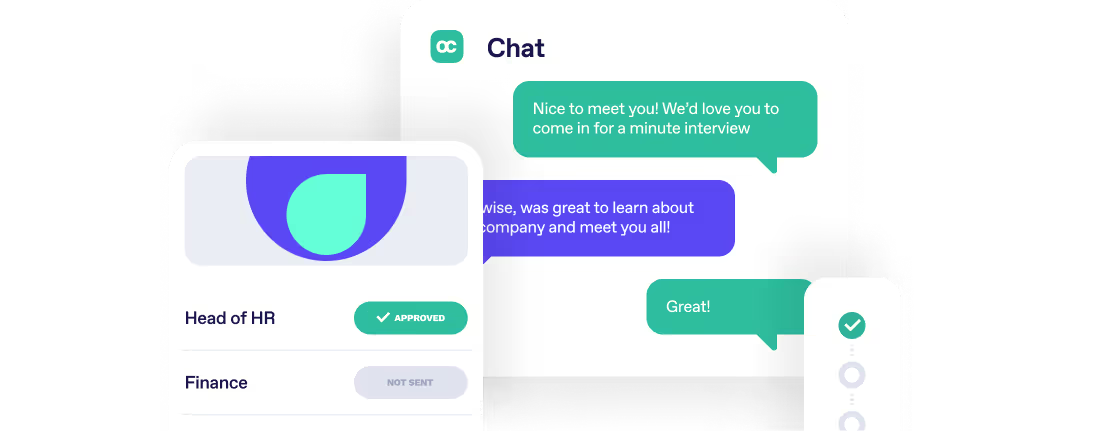How to Create a Great Company Culture



It’s easy to get caught up in the numbers game of business. But the people behind those percentages and statistics are choosing companies that offer a culture that cares about their individual needs.
A good company culture can be the determining factor for new recruits, as well as the reason your best employees choose to stay with your company. A study by the Addison Group found that 8 in 10 employees said they would start looking for a new job after just one bad day at their current company. In fact, 81% of the job seekers that were polled indicated that dissatisfaction with their work environment was the main reason they went back on the job market. This means the company culture directly affects your retention rate...and attrition rate.
Creating a successful company culture is all about making employees feel valued, engaged and productive. However, it takes more than good compensation and a few basic perks to establish a culture that current employees want to talk about and potential employees want to join. These are our best tips and tricks on “How to Create a Great Company Culture.”

Focus on employee collaboration
At its foundation, a good company culture means that employees want to come to work day in and day out. Fostering workplace relationships, giving employees something to look forward to and ensuring that people’s voices are heard and valued are proven ways to increase this desire and, thus, your culture.
CultureIQ found that employees rated their company’s qualities, including collaboration, 20% higher when they worked at a company with a strong culture. Additionally, companies that are often associated with their employee culture, such as Google and Apple, purposefully create spaces of collaboration for their employees. For example, Google made the tables in their lunchroom--where employees gather every day for a free lunch--larger and longer in order to expose employees to more people they can form relationships with.
There’s a real payoff to collaboration, as well. A Stanford study found that participants who acted collaboratively stuck at their task 64% longer than those who worked individually. The collaborators also reported higher engagement, lower fatigue and higher success rate. Another study conducted by the Institute of Corporate Productivity found that companies that promoted collaboration were five times as likely to be high performing than those that didn’t.
To foster more organic collaboration in your workplace, implement these tried-and-true strategies:
- Utilise online or social media platforms where employees can communicate with each other and higher-ups. This is also where they can stay engaged on projects and workplace decisions.
- Create a space in your office where employees can relax and mingle. The company Empower created a centralised coffee spot on their first floor where employees from every department could meet and get to know one another.
- Plan a monthly or quarterly group activity where employees can do something interactive together. Try an exercise class such as Soul Cycle or yoga, or follow in the footsteps of Apple and throw an annual “Beer Bash.”
INSERT-CTA
Align your company principles and values with your employees
Recent studies have found that Millennials, more so than the generations before them, want to work for companies that have the same social values as they do. According to Forbes, this generation of workers want to feel fulfilled and empowered that their work is making a real impact, more than they want a higher paycheck. This means that they will choose a company culture that shares a purpose with them--and implements this purpose into their perks--over one that has unclear or opposing values, even if it is higher paid.
Modern companies are appealing to this younger generation through community involvement, flexible scheduling and work-life balance. For example, Sweetgreen offers employees opportunities to get involved with community impact projects. The company recently partnered with the LA Food Policy Council to revive a local family-run grocery market. A website development firm, on the other hand, names the phrase “You Are Unique” as one of their main values, and as a perk they give every employee a paid day off on their birthday to celebrate their individual uniqueness.
The principle of work-life balance also translates to more flexible scheduling options for employees. Inc. found that up to 92% of millennials want the option to work remotely, and 87% want to work on their own schedule. Meanwhile, a Boston College study of over 19,000 employees found that stress and burnout was lower for workers who had some sort of workplace flexibility arrangement.
To create an company culture that attracts and retains this new generation of workers, which currently make up over one third of the workforce, you should rethink how your company’s values and principles relate to both the individual and the larger community. If your purpose aligns with that of your employees, you can foster a more engaged, loyal and productive company culture.
Prioritise the holistic well-being of your employees
Employee healthcare has always been an important factor in creating a successful company culture, but the increase of stress and burnout thanks to constant information overload has called for a more well-rounded approach.
A Harvard Business Review marketplace survey found that nearly 70% of respondents said that their employers were not doing enough to prevent or alleviate burnout. Being overworked can lead to stress, absences and negative views of company culture--in addition to serious medical issues. According to an ESRI study, anxiety and stress are the second highest causes of work-related illness in Ireland. Absenteeism due to stress costs UK employers an estimated 3.7 billion pounds a year. In addition to that, 40% of job turnover in the US is due to stress.
Keeping employees happy and healthy is essential to a good company culture, and more and more companies are starting to implement mental health programs. Facebook, for example, offers their employees health screenings, mindfulness and yoga classes, financial well-being programs and even sleep programs. All of these perks directly target the issue of stress and create a more open and empathetic company culture. Lidl also runs a well-being program for its employees called “Live Safe. Work Well.” This program provides mental health training that teaches employees how to manage anxiety and stress in the workplace.
Creating a workplace environment that is conducive to good mental health not only keeps your employees healthy enough to come to work every day--it also helps them work better. According to Inc., 85% of employees say they are more likely to take initiative when they are happy at work, and 73% say they are better collaborators. Investing in your employees’ wellbeing will make them want to invest in you; that’s good company culture.

Use the latest technology to your advantage
Technology is your friend when it comes to forging a competitive employer brand, engaging employees and creating more time to focus on the people behind your company. In other words, technology is the tool you can use to put all of the previous tips to action.
The Happiness Indicator found that “feeling valued as an individual” was one of the top five factors of workplace happiness. Many companies are implementing software and technology that helps employers build a culture of value through appreciation and recognition, such as reward-based programs or chatbots. Recruitment and AI-based software can also help express appreciation during the onboarding process with customisable welcome messages and orientation programs. This type of HR software has also been proven to save the hiring team hours previously spent on transactional work, freeing them up to focus on learning what employees really want from a perfect company culture.
Cloud-based systems are also a simple solution to the issue of remote work. A marketing and advertising company has allowed employees to work from anywhere in the world thanks to digital tools like Slack and Dropbox, which keep everyone connected and working productively. Online spaces such as these encourage collaboration while also appealing to less-traditional Millennials, and they can be a useful way for companies to gather employee feedback. Web and mobile-based platforms, such as Wrkit, have even been used to target employee wellness, with online stress management training resulting in lower employee stress levels.
People are used to having their consumer needs fulfilled by their digital devices, so it makes sense that they would want the same in their workplace. It is more essential than ever for the HR department to go digital, and endless options of helpful technology can create a more seamless, user-friendly and up-to-date company culture.
INSERT-LINE
On a numbers scale, a good company culture increases revenue growth and helps companies hire the best candidates. On a human scale, it does so much more, from fostering collaboration and work relationships to giving employees a sense of purpose.
If you want to take a step in the right direction and start spending more time and energy on employee satisfaction, Occupop is the software for you. We use AI technology to automate the recruiting process, saving you up to 4-5 hours a week and creating seamless engagement with your potential hires. We also work as a centralised platform for the hiring team, allowing different team members to sign on and collaborate wherever and whenever.
Check out our website to get started for free, and subscribe below to get more employer tips and tricks sent straight to your inbox!
Summary Points
Creating a successful company culture is all about making employees feel valued, engaged and productive. here is how:
- Focus on Employee Collaboration: Fostering workplace relationships, giving employees something to look forward to and ensuring that people’s voices are heard and valued are proven ways to increase this desire and, thus, your culture.
- Align Your Company Principles and Values With Your Employees: Recent studies have found that Millennials, more so than the generations before them, want to work for companies that have the same social values as they do. Modern companies are appealing to this younger generation through community involvement, flexible scheduling and work-life balance.
- Prioritise the Holistic Well-being of Your Employees: Employee healthcare has always been an important factor in creating a successful company culture, but the increase of stress and burnout thanks to constant information overload has called for a more well-rounded approach. Facebook, for example, offers their employees health screenings, mindfulness and yoga classes, financial well-being programs and even sleep programs.
- Use the Latest Technology to Your Advantage: Technology is your friend when it comes to forging a competitive employer brand, engaging employees and creating more time to focus on the people behind your company. In other words, technology is the tool you can use to put all of the previous tips to action. Many companies are implementing software and technology that helps employers build a culture of value through appreciation and recognition, such as reward-based programs or chatbots.
Simple. Beautiful.
Recruitment Software.
HR updates sent straight to your inbox
You might also like...


Manage your entire hiring process simply, from engagement to management, hiring and onboarding







Simple. Beautiful.
Recruitment Software.
Recruitment Software.






